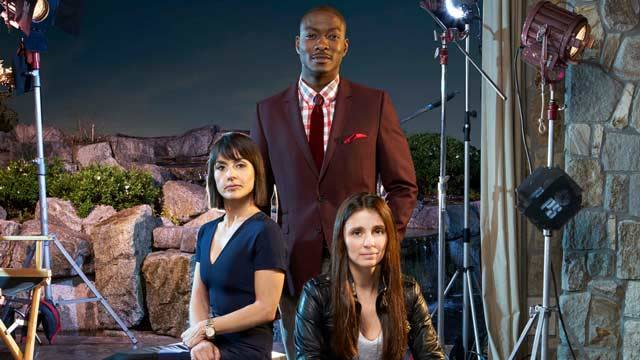‘UnREAL’: Season Two Gets Really Real

The second season of UnREAL, premiering Monday night on Lifetime, ups the stakes for this fictional parody-drama-comedy of a Bachelor-like reality show called Everlasting. The premiere finds the show’s two heroes — Everlasting producers Quinn (Constance Zimmer) and Rachel (Shiri Appleby) — bonding over their takeover of the dating-show franchise even as their relationship as mentor and mentee is starting to fray.
Rachel has been promoted to showrunner, with Quinn executive-producing, but the latter is having a hard time letting go of running the day-to-day (or in Everlasting’s case, minute-to-minute) decision-making. Adding to the stress is the decision to make this season’s Everlasting “suitor” a black man. As played by B.J. Britt, pro-footballer Darius Beck is a high-profile athlete looking to rehabilitate his image after a hostile exchange with a female sportscaster, so what better way to do that than to appear on a show that exploits all sorts of female stereotypes?
Related: 6 Things to Know About ‘UnREAL’ Season 2
Such is the all-too-true-to-life reasoning that goes on in pop-culture public relations and reality-TV production offices these days. Darius’s dicey decision sets up a wealth of dramatic — and comic — possibilities for UnREAL, which now gets to place race as prominently as sex, gender roles, and office politics in its provocative mix.
The series co-created by Marti Noxon and Sarah Gertrude Shapiro proceeds in much the same way the show-within-the-show does: UnREAL is as fast-paced yet precise about the serious indignities women face as Everlasting is about the fluff it tries to romanticize. Thus early on in the new season, a blonde Southerner who’s been booked on the show mostly because she flaunted her Confederate flag bikini on Instagram must grapple with the fall-out from that decision after the big reveal of the first black suitor. Another subplot involves booking a black political activist as a contestant in the hope that she’ll get into heated arguments with the Southern girl as well as Darius, whom everyone assumes will be a political naïf, if not an overt sexist.
UnREAL, whose first season won it a prestigious Peabody — surely a first for Lifetime, the home of such TV-movie fare as An Officer and a Murderer — retains its focus on the central relationship of the show, which is Rachel and Quinn’s complex friendship, their tough-minded realism and frayed idealism, and their often-unspoken agreement that it’s Us Against Them (“them” being the mostly-arrogant, often-weak men surrounding them). The show is studded with dialogue that sometimes seems destined to be quoted as 21st-century wit (“We don’t solve problems; we create them and then we point cameras at them”).
Sometimes I wonder if UnREAL actually buys some of its more provocative declarations. For instance, does Rachel truly believe, as she tells one reluctant contestant, that reality TV has societal value because, she asserts, teen pregnancy rate went down after the debut of Teen Mom and that the gay rights movement “began” with The Real World? I hope not, but I suspect, uneasily, that UnREAL wants us to be as wowed by this as the contestant is.
You can have reservations — indeed, UnREAL thrives on its own contradictions — and still appreciate that the show is working in rare territory. UnREAL is as hard-boiled and adventuresome as any male-dominated, gritty, “dark” premium-cable show you’d care to throw an Emmy at. The performances by Zimmer and Appleby are amazingly nuanced and layered, especially for a show whose gimmick, Everlasting, insists upon the superficiality of women’s images of themselves. You don’t have to have seen the first season to get on board for the second. But you’d better be ready to get taken for one fast, wild ride that expects you to pay attention and keep up.
Missed last season? Catch up here:
UnREAL airs Monday nights at 10 p.m. on Lifetime.


